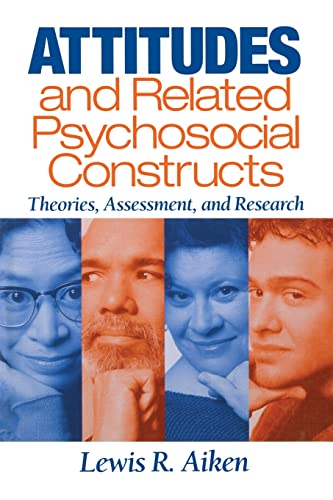Attitudes and Related Psychosocial Constructs Theories, Assessment, and Research
Lewis R. Aiken received his Ph.D. in psychology from the University of North Carolina at Chapel Hill. He subsequently taught at UNC-Greensboro, where he was also Director of Admissions and Placement Research. Other teaching appointments have included Guilford College (where he was Dana Professor of Psychology and Department Chair), UCLA, the University for Teacher Education in Tehran, University of the Pacific, and Pepperdine University. He has received numerous awards, including an NAS-NRC Postdoctoral Resident Research Associateship (U.S. Navy Research Laboratory and San Diego State University), a U.S.O.E. Postdoctoral Fellowship (Stanford University and the University of Georgia), and a Fulbright research /lectureship. Dr. Aiken has also served as a consultant for numerous educational, governmental, health, and industrial organizations and has worked in many different educational, clinical/counseling, research, and business situations. His research interests are in psychological assessment and social and personality psychology, and he has published books on psychological and educational assessment, personality, adult development and aging, death and dying, and general psychology. His popular textbook Psychological Testing & Assessment remains a best-seller in its field, having recently entered a tenth edition. ... Read more Read less
I would find this book a tempting alternative to my current text for two reasons: its coverage of more recent search and theorizing…and its focus on applications of attitude measurement and survey research to a number of very important practical issues'- Richard Harris, University of New Mexico Attitudes have a major impact upon behaviour and upon one's ability to manage and adapt to change while also influencing the behaviour of those around oneself. This book provides a compact but comprehensive, research-oriented treatment of attitudes and related psychosocial constructs (values, opinions, beliefs, and personal orientations). It focuses on the meaning, measurement, and utility of attitudes in various applied settings, such as education or the workplace. The topics explored include social and personal matters such as prejudice and discrimination, illness and disability, death and dying, poverty and unemployment, conflict and violence, schools and teachers, work and retirement, and politics, religion, and morality. The book should prove of interest to both students and professionals who find themselves involved with measuring, evaluating, and modifying attitudes. ... Read more Read less











